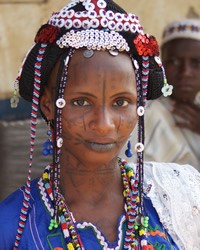Fulani, Nigerian in Nigeria

Photo Source:
Rosemary Lodge - Flickr
Creative Commons
|
Send Joshua Project a map of this people group.
|
| People Name: | Fulani, Nigerian |
| Country: | Nigeria |
| 10/40 Window: | Yes |
| Population: | 20,599,000 |
| World Population: | 20,805,000 |
| Primary Language: | Fulfulde, Nigerian |
| Primary Religion: | Islam |
| Christian Adherents: | 0.26 % |
| Evangelicals: | 0.26 % |
| Scripture: | New Testament |
| Ministry Resources: | Yes |
| Jesus Film: | Yes |
| Audio Recordings: | Yes |
| People Cluster: | Fulani / Fulbe |
| Affinity Bloc: | Sub-Saharan Peoples |
| Progress Level: |
|
Introduction / History
As their name suggests, the vast majority of the Nigerian Fulani live in Nigeria. A smaller population lives in southern Chad and Cameroon. The Nigerian Fulani are bound together by their language of Fulfulde and their Islamic faith.
What Are Their Lives Like?
Nigerian Fulani are primarily cattle herders in the savannah region. They generally migrate between two locations, one for dry season and one for rainy season. In times of abundant rain, they prosper but can face starvation in periods of draught. The number of cattle determines the wealth of a Fulani family.
These semi-nomadic people fiercely reject anything they perceive as contrary to their lifestyle of roaming with their cattle herds. This includes education (they are mostly non-literate) and permanent homes.
Nigerian Fulani are widely regarded as troublesome impediments by those who own large cattle ranchers. One businessman has established two large cattle ranches, forcing the Fulani tribal people from their historic grazing land. They were given no compensation. Their inability to read has placed them on unequal footing with those who have legal power to take advantage of them.
The Nigerian Fulani also have conflicts with settled farmers. They compete for the same land. Farmers stay put and grow crops on specific land, which restricts nomadic herders like the Nigerian Fulani.
Nigerian Fulani are gradually losing their traditional grazing land. Local governments are encouraging the Fulani to settle in one place and take up agriculture. Most wish to maintain the life of their ancestors while others are moving to cities hoping for a better life and educational opportunities for children. They often have to take menial jobs due to their lack of literacy and marketable skills.
What Are Their Beliefs?
The Fulani were among the first West Africans to convert to Islam, and this religious system is central to their identity. Leaving Islam will bring serious consequences for those choosing to follow Isa or Jesus.
They still practice pre-Islamic rituals which would be frowned upon by more orthodox Muslims. They believe Allah is too distant to help them with their daily needs.
The Nigerian Fulani are expected to follow a code of high moral behavior known as Pulaaku. Pulaaku extols virtues such as kindness, bravery, patience, tolerance, perseverance, honesty, diligence, generosity, and dignity. To be reserved is part of being dignified; thus, they are shy and modest in public.
What Are Their Needs?
The Nigerian Fulani need to prepare for the future. This will mean making a way in their communities for education.
Prayer Points
Pray the Fulani would be able to care adequately for their families and be led to be better prepared for the rapidly changing conditions of the 21st century.
Pray they would see the need to make schooling a priority for their children.
Pray for Nigerian Fulani families to overcome their conflicts with Christian farmers so they can open their hearts and minds to the ways of Jesus.
Pray for the Holy Spirit to arrange for a disciple making movement among the Nigerian Fulani.